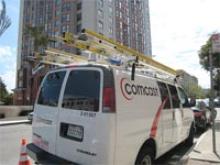Image


You may think to yourself, Hey, come on, it's 90 minutes out of your day. But what I think about is how much time cumulatively was wasted in Seattle this morning, much of it simply because people would not have been sure where the problem was. An early, all-hands-on-deck announcement from Comcast would have been a big help. It seems slightly insane that a company that provides internet service isn't very good at using the internet.The folks at Sunbreak apparently were not aware that the City is still slowly considering building a network to ensure everyone in the community has affordable high speed broadband access (which would likely be far more reliable than Comcast's network). After I noted this in the comments, they reprinted one of my posts about Seattle's deliberations. Meanwhile, the folks in Scranton, Pennsylvania, (immortalized in the television show The Office) have been asking when they get the faster broadband now available in Philly, Pittsburgh, and parts of the Lehigh Valley. The answer came bluntly from Stop the Cap: Sorry Scranton, You’re Stuck With Comcast Cable… Indefinitely An article from the Times Tribune explains why the private sector fails to provide competition:
"Offering out television service is expensive, too expensive for most smaller telephone companies," said telecom industry analyst Jeff Kagan. "So many are reselling satellite service to keep customers who want one bundle and one bill." Because of that, satellite television providers, who were never a formidable challenge to conventional cable companies, gained market share, Mr. Kagan said.A stand-up comic from Comcast responded:
Comcast spokesperson Bob Grove said the Comcast upgrades originated from the demands of customers, not the offerings of competitors.And the crowd went crazy! Hilarious joke! I guess the people who have slower services just didn't beg enough… also Comcast ignores competitive pressures, something their shareholders may be interested to know. Stop the Cap's article noted that the private sector even suggest that competition in cable networks is impractical:
As far as the cable industry is concerned, they’d prefer Verizon just stay out of the video business altogether. Dr. John “Darth Vader” Malone, a former cable kingpin that owned Tele-Communications, Inc. (TCI), said there is room for only one player in the wired video business — cable companies. “I’ve never seen overbuilds work … it always ends up badly,” Malone has said repeatedly about cable competition.Of course, as we have carefully documented, community networks have thoroughly succeeded… though whether they should be considered "overbuilds" when they are offering far superior services is perhaps a contentious question. Unfortunately, the article author, David Falchek, fails to note that Pennsylvania law preempts the authority of local governments to step in and build faster networks that would offer broadband for lower prices (see our preemption map for more details). Here we find the reality for thousands of communities: the private sector cannot provide sufficient competition to drive proper investment or lower prices and state laws protect incumbent providers from competitive pressures. Photo used under Creative Commons license, courtesy of Titanas on flickr.
